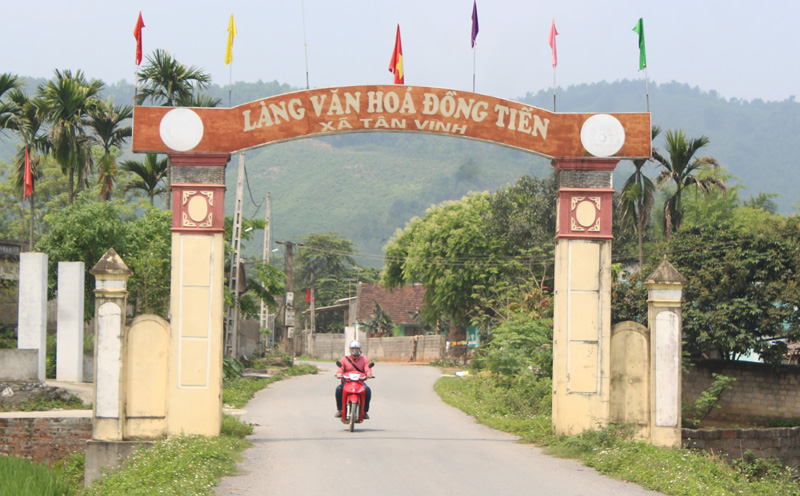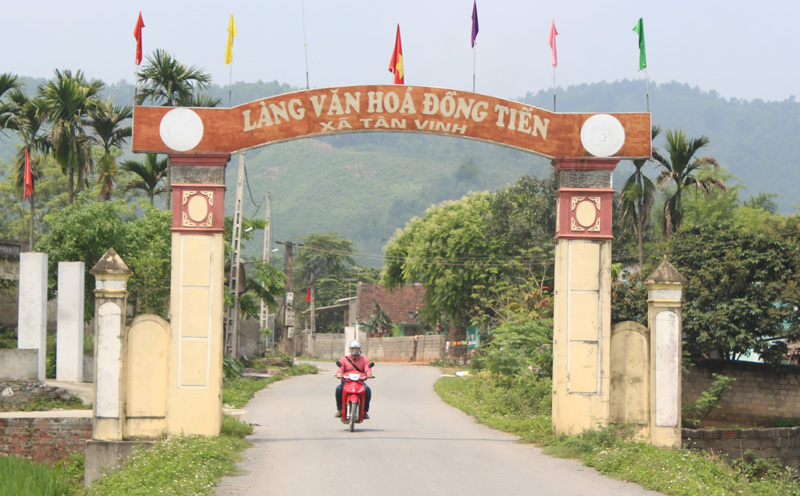
(HBO) – In 2019, all 146 residential areas of Luong Son district, Hoa Binh province, registered for the title of cultural residential area. Only 80.8 percent of them, or 118, were selected for the title. It showed that the selection process was serious and transparent to honour those that deserve.
 Cultural
residential areas in Luong Son district are clean, green,
attractive and civilised. (Photo: Dong Tien Cultural Village in Tan Vinh
Commune).
Cultural
residential areas in Luong Son district are clean, green,
attractive and civilised. (Photo: Dong Tien Cultural Village in Tan Vinh
Commune).
The district’s
campaign "All people unite to build a cultural life” is different from others
as it is associated with the local emulation movement on new-style rural
building. So that, the district has paid particular heed to build and improve
the quality of commune-based cultural and sport centres.
So far, 15 out
of 19 communes, or 78.9 percent, in the district have a cultural centre, of
which investment came from the State budget and private sectors. All 146
villages and sub-areas have a
cultural house and spaces for
sport activities. Thanks to such facilities, all 184 public art troupes in the district have a venue to practice, contributing to improving the
cultural life of the locals.
The cultural
residential area campaign has
had a profound positive impact on social life and contributed to maintaining
social order and stability and fostering economic and cultural development.
The cultural
residential quarters have also made concerted efforts, by donating money,
materials and labour, to construct roads and cultural houses.
Particularly,
the local Women's Unions, Youth Unions, Veterans' Associations have together
planted flowers and trees on the sides of roads and managed the roads well to
make the local landscape more attactive, cleaner and greener.
Such efforts
have given a facelift to rural residential areas in Luong Son.
In November,
the district sucessfully organised the Great National Unity Festivals at all
residential areas to mark the
89th founding anniversary of the Vietnam Fatherland Front (November 18). On the
occasion, the district presented 12 charity houses to poor people and honour
1,145 individuals and organisations in recognition of their outstanding contribution to the emulation
movement on new-style rural building./.
With an increasingly vibrant and widespread emulation movement aimed at building cultured residential areas and cultured families, Yen Thuy District has been making steady progress toward improving both the material and spiritual well-being of its people, while fostering a civilized, prosperous, beautiful, and progressive community.
Once lacking recreational spaces and community facilities, Residential Group 2 in Quynh Lam Ward (Hoa Binh City) has recently received attention for the construction of a new, spacious, and fully equipped cultural house. The project followed the model of state support combined with public contributions in both labor and funding.
The "All people unite to build cultural life" movement, which has been effectively integrated with Kim Boi district’s socio-economic development goals, is fostering a lively spirit of emulation across local residential areas, hamlets, villages, public agencies, and enterprises. In addition, through the initiative, traditional cultural values are being preserved and promoted, while community solidarity and mutual support in poverty reduction and economic development are being strengthened.
A working delegation of the Hoa Binh provincial People’s Committee led by its Permanent Vice Chairman Nguyen Van Toan on June 11 inspected the progress of a project to build the Mo Muong Cultural Heritage Conservation Space linked to tourism services in Hop Phong commune, Cao Phong district.
Born and growing in the heroic land of Muong Dong, Dinh Thi Kieu Dung, a resident in Bo town of Kim Boi district, in her childhood was nurtured by the sweet lullabies of her grandmother and mother. These melodies deeply imprinted on her soul, becoming an inseparable part of her love for her ethnic group's culture. For over 20 years, this love for her hometown has driven Dung to research, collect, and pass down the cultural values of the Muong people to future generations.
In the final days of May, the Ethnic Art Troupe of Hoa Binh Province organized performances to serve the people in remote, mountainous, and particularly disadvantaged areas within the province. These were not just ordinary artistic shows, but they were the meaningful journeys aimed at spreading cultural values, enhancing the spiritual life of the people and contributing to the preservation of ethnic minority cultural identities.



 Cultural
residential areas in Luong Son district are clean, green,
attractive and civilised. (Photo: Dong Tien Cultural Village in Tan Vinh
Commune).
Cultural
residential areas in Luong Son district are clean, green,
attractive and civilised. (Photo: Dong Tien Cultural Village in Tan Vinh
Commune).